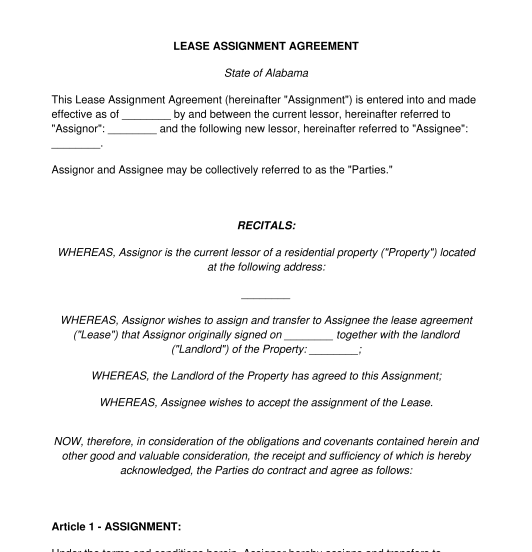Assignment of Lease


Jump to Section
What is an assignment of lease.
The assignment of lease is a title document that transfers all rights possessed by a lessee or tenant to a property to another party. The assignee takes the assignor’s place in the landlord-tenant relationship.
You can view an example of a lease assignment here .
How Lease Assignment Works
In cases where a tenant wants to or needs to get out of their lease before it expires, lease assignment provides a legal option to assign or transfer rights of the lease to someone else. For instance, if in a commercial lease a business leases a place for 12 months but the business moves or shuts down after 10 months, the person can transfer the lease to someone else through an assignment of the lease. In this case, they will not have to pay rent for the last two months as the new assigned tenant will be responsible for that.
However, before the original tenant can be released of any responsibilities associated with the lease, other requirements need to be satisfied. The landlord needs to consent to the lease transfer through a “License to Assign” document. It is crucial to complete this document before moving on to the assignment of lease as the landlord may refuse to approve the assignment.
Difference Between Assignment of Lease and Subletting
A transfer of the remaining interest in a lease, also known as assignment, is possible when implied rights to assign exist. Some leases do not allow assignment or sharing of possessions or property under a lease. An assignment ensures the complete transfer of the rights to the property from one tenant to another.
The assignor is no longer responsible for rent or utilities and other costs that they might have had under the lease. Here, the assignee becomes the tenant and takes over all responsibilities such as rent. However, unless the assignee is released of all liabilities by the landlord, they remain responsible if the new tenant defaults.
A sublease is a new lease agreement between the tenant (or the sublessor) and a third-party (or the sublessee) for a portion of the lease. The original lease agreement between the landlord and the sublessor (or original tenant) still remains in place. The original tenant still remains responsible for all duties set under the lease.
Here are some key differences between subletting and assigning a lease:
- Under a sublease, the original lease agreement still remains in place.
- The original tenant retains all responsibilities under a sublease agreement.
- A sublease can be for less than all of the property, such as for a room, general area, portion of the leased premises, etc.
- Subleasing can be for a portion of the lease term. For instance, a tenant can sublease the property for a month and then retain it after the third-party completes their month-long sublet.
- Since the sublease agreement is between the tenant and the third-party, rent is often negotiable, based on the term of the sublease and other circumstances.
- The third-party in a sublease agreement does not have a direct relationship with the landlord.
- The subtenant will need to seek consent of both the tenant and the landlord to make any repairs or changes to the property during their sublease.
Here is more on an assignment of lease here .
Parties Involved in Lease Assignment
There are three parties involved in a lease assignment – the landlord or owner of the property, the assignor and the assignee. The original lease agreement is between the landlord and the tenant, or the assignor. The lease agreement outlines the duties and responsibilities of both parties when it comes to renting the property. Now, when the tenant decides to assign the lease to a third-party, the third-party is known as the assignee. The assignee takes on the responsibilities laid under the original lease agreement between the assignor and the landlord. The landlord must consent to the assignment of the lease prior to the assignment.
For example, Jake is renting a commercial property for his business from Paul for two years beginning January 2013 up until January 2015. In January 2014, Jake suffers a financial crisis and has to close down his business to move to a different city. Jake doesn’t want to continue paying rent on the property as he will not be using it for a year left of the lease. Jake’s friend, John would soon be turning his digital business into a brick-and-mortar store. John has been looking for a space to kick start his venture. Jake can assign his space for the rest of the lease term to John through an assignment of lease. Jake will need to seek the approval of his landlord and then begin the assignment process. Here, Jake will be the assignor who transfers all his lease related duties and responsibilities to John, who will be the assignee.
You can read more on lease agreements here .

Image via Pexels by RODNAE
Assignment of Lease From Seller to Buyer
In case of a residential property, a landlord can assign his leases to the new buyer of the building. The landlord will assign the right to collect rent to the buyer. This will allow the buyer to collect any and all rent from existing tenants in that property. This assignment can also include the assignment of security deposits, if the parties agree to it. This type of assignment provides protection to the buyer so they can collect rent on the property.
The assignment of a lease from the seller to a buyer also requires that all tenants are made aware of the sale of the property. The buyer-seller should give proper notice to the tenants along with a notice of assignment of lease signed by both the buyer and the seller. Tenants should also be informed about the contact information of the new landlord and the payment methods to be used to pay rent to the new landlord.
You can read more on buyer-seller lease assignments here .
Get Help with an Assignment of Lease
Do you have any questions about a lease assignment and want to speak to an expert? Post a project today on ContractsCounsel and receive bids from real estate lawyers who specialize in lease assignment.
Meet some of our Assignment of Lease Lawyers
I am a seasoned corporate transactional attorney with over 20 years of combined outside and inside General Counsel experience. My experience includes helping companies of all sizes, including start-ups with general corporate matters and commercial transactions.
Keidi S. Carrington brings a wealth of legal knowledge and business experience in the financial services area with a particular focus on investment management. She is a former securities examiner at the United States Securities & Exchange Commission (SEC) and Associate Counsel at State Street Bank & Trust and has consulted for various investment houses and private investment entities. Her work has included developing a mutual fund that invested in equity securities of listed real estate investment trusts (REITs) and other listed real estate companies; establishing private equity and hedge funds that help clients raise capital by preparing offering materials, negotiating with prospective investors, preparing partnership and LLC operating agreements and advising on and documenting management arrangements; advising on the establishment of Initial Coin Offerings (ICOs/Token Offerings) and counseling SEC registered and state investment advisers regarding organizational structure and compliance. Ms. Carrington is a graduate of Johns Hopkins University with a B.A. in International Relations. She earned her Juris Doctorate from New England Law | Boston and her LL.M. in Banking and Financial Law from Boston University School of Law. She is admitted to practice in Massachusetts and New York. Currently, her practice focuses on assisting investors, start-ups, small and mid-size businesses with their legal needs in the areas of corporate and securities law.
Retired Dentist transitioned to Law, with a special interest in Commercial Real Estate, Startup businesses, Asset Purchase Agreements, and Employment Contracts. I love to help dentists and physicians with legal issues pertaining to licensing, credentialing, employment, and general business-legal questions.
T. Phillip B.
Attorney creating plans and strategies to help individuals create, build, protect and pass on wealth.
Corporate counsel with years of in-house experience working with and reporting to board / executive-level and upper management, along with extensive regional / national law firm background in commercial transactions and contracts, complex commercial litigation, and employment matters. Skilled at executing corporate priorities, driving profitability by implementing goal-oriented processes to achieve revenue and productivity targets, and managing company litigation and outside counsel. Recognized for creating policies and practices to address ethical dilemmas and resolving misconduct.
Jim Slattery most recently served as General Counsel at Regional News Network, a large owner of broadcast television stations. Jim is an experienced attorney with broad-based expertise. He is a seasoned negotiator who has been involved in negotiations as complex as the Olympic Games. Jim spent 18 years as Vice President for Business and Legal Affairs at NBCUniversal. Previously, Jim worked in the media industry in various roles at All American Television. Jim’s success can be attributed to his ability to properly analyze data, manage projects, lead teams, develop creative solutions for complex problems, focus on strategically optimizing assets, manage/allocate risk and collaborate with divergent constituent groups to achieve objectives. Jim received a J.D. and a B.B.A. from the University of Notre Dame.
Jonathan H.
I’m an attorney focusing my practice on concierge corporate and intellectual property law for startups and high-growth companies. I also serve as outside General Counsel to several businesses in various sectors. Since founding my practice I've worked with hundreds of clients across a variety of industries. My experience as a former General Counsel of a premier edtech company gives me unique insight into the challenges my clients face and how to resolve them efficiently and cost-effectively.
Find the best lawyer for your project
Contract to lease land from a church.
I’m planning on leasing land from a church. Putting a gym on the property. And leasing it back to the school.
Ok; first step is that you will need a leasing contract with the church. Ask them to prepare one for you so you would just need an attorney to review the agreement and that should cost less than if you had to be the party to pay a lawyer to draft it from scratch. You need to ensure that the purpose of the lease is clearly stated - that you plan to put a gym on the land so that there are no issues if the church leadership changes. Step 2 - you will need a lease agreement with the school that your leasing it do (hopefully one that is similar to the original one your received from the church). Again, please ensure that all the terms that you discuss and agree to are in the document; including length of time, price and how to resolve disputes if you have one. I hope this is helpful. If you would like me to assist you further, you can contact me on Contracts Counsel and we can discuss a fee for my services. Regards, Donya Ramsay (Gordon)

Quick, user friendly and one of the better ways I've come across to get ahold of lawyers willing to take new clients.
How It Works
Post Your Project
Get Free Bids to Compare
Hire Your Lawyer
Real Estate lawyers by top cities
- Austin Real Estate Lawyers
- Boston Real Estate Lawyers
- Chicago Real Estate Lawyers
- Dallas Real Estate Lawyers
- Denver Real Estate Lawyers
- Houston Real Estate Lawyers
- Los Angeles Real Estate Lawyers
- New York Real Estate Lawyers
- Phoenix Real Estate Lawyers
- San Diego Real Estate Lawyers
- Tampa Real Estate Lawyers
Assignment of Lease lawyers by city
- Austin Assignment of Lease Lawyers
- Boston Assignment of Lease Lawyers
- Chicago Assignment of Lease Lawyers
- Dallas Assignment of Lease Lawyers
- Denver Assignment of Lease Lawyers
- Houston Assignment of Lease Lawyers
- Los Angeles Assignment of Lease Lawyers
- New York Assignment of Lease Lawyers
- Phoenix Assignment of Lease Lawyers
- San Diego Assignment of Lease Lawyers
- Tampa Assignment of Lease Lawyers
Contracts Counsel was incredibly helpful and easy to use. I submitted a project for a lawyer's help within a day I had received over 6 proposals from qualified lawyers. I submitted a bid that works best for my business and we went forward with the project.
I never knew how difficult it was to obtain representation or a lawyer, and ContractsCounsel was EXACTLY the type of service I was hoping for when I was in a pinch. Working with their service was efficient, effective and made me feel in control. Thank you so much and should I ever need attorney services down the road, I'll certainly be a repeat customer.
I got 5 bids within 24h of posting my project. I choose the person who provided the most detailed and relevant intro letter, highlighting their experience relevant to my project. I am very satisfied with the outcome and quality of the two agreements that were produced, they actually far exceed my expectations.
Want to speak to someone?
Get in touch below and we will schedule a time to connect!
Find lawyers and attorneys by city

- Legal GPS for Business
- All Contracts
- Member-Managed Operating Agreement
- Manager-Managed Operating Agreement
- S Corp LLC Operating Agreement
- Multi-Member LLC Operating Agreement
- Multi-Member LLC Operating Agreement (S Corp)
Demystifying Assignment of Lease: Your Go-To Guide
LegalGPS : July 29, 2023 at 8:17 AM
When you’re talking about property leasing, it’s important to understand that there are a lot of terms and concepts that you may have never heard before. One of them is the assignment of lease, which refers to a situation where a tenant transfers their rights and responsibilities under the lease agreement to another party.

What is an Assignment of Lease, and why is it so crucial?
An Assignment of Lease is a term you may have heard thrown around, especially if you're involved in rental properties. It’s a pretty important document. But what exactly is it? Well, in simple terms, an Assignment of Lease is an agreement where the original tenant of a property transfers their leases and all of its rights and obligations to a new tenant. Now, you might be wondering, "When would this scenario ever occur?"
Let's imagine you're a tenant who signed a three-year lease for an office space. However, two years in, you need to relocate due to unprecedented growth of your business. Instead of breaking the lease, you might choose to assign your lease to another business looking for office space. This means that you, as the original tenant, no longer have any obligations under the lease. The new tenant is now responsible for paying rent and complying with all of the terms of the previously signed agreement.
Now that you understand, let's get into the step-to-step guide on how to create an Assignment of Lease!
Steps to Write an Assignment of Lease
Creating a thorough Assignment of Lease agreement doesn't need to be an overwhelming task. Simply follow these steps to ensure your agreement is both comprehensive and legally binding:
Step 1: Identify the Parties
The information of each party should be included. For the existing tenant (the assignor), make sure to include:
Full legal name or business name
Postal mailing address
Phone number and email address
Do the same for the new tenant (the assignee). Make sure all the information is up-to-date and accurate to avoid any unnecessary confusion or disputes. For example, if the assignor is a business, make sure they have updated their mailing address with the post office to reflect their new building location. If a party has multiple addresses, be sure to list them all.
Step 2: Specify the Lease
This section requires exact information from the original lease agreement, including:
Property address and description
Lease start and end date
A reference to the original lease agreement (for instance, a sentence like "the lease agreement dated...")
Remember to include a copy of the original lease as an attachment to ensure the assignee understands the terms they're adhering to. If not already included in the original lease agreement, be sure to add the following information: Description of rental property, Lease term (how long the lease is good for), Rent amount, and Security deposit amount.
Step 3: Detail the Assignment
State that the assignor is transferring all their interests and obligations in the lease to the assignee. Here, write something like:
"The Assignor hereby assigns, transfers, and conveys to the Assignee all of the Assignor's rights, title, and interest in and to the Lease, together with all the Assignor's obligations, liabilities, and duties under the Lease."
This means that the assignor is transferring all of their interests and obligations in the lease to the assignee. This includes any future rent payments, repairs and maintenance responsibilities, notices of default by either party, and so on.
Step 4: Landlord's Consent
Many leases require the landlord's consent to assign the lease. The assignor should request written consent from the landlord and include a clause like:
"The assignment of the lease is not valid unless and until the landlord provides written consent."
This is followed by a place for the landlord to affirm consent by signing or initialing. This is important because the landlord can elect to withhold consent and the assignment will not be valid. If this is the case, you may need to provide additional consideration for your landlord's assent (for example, an increase in rent).
Step 5: Assignee Acceptance
Include a statement in which the new tenant agrees to the assignment and the terms of the lease. It may look like:
"The Assignee hereby accepts this assignment, assumes all duties and responsibilities under the Lease, and agrees to perform all of the Assignor's obligations under the Lease."
You need to do this because the new tenant needs to have an affirmative acceptance of the assignment in order for it to be valid. This is typically done through a letter from the assignee stating that they agree to perform all of your obligations under the lease.
Step 6: Signature and Date
Every binding legal document needs a date and a signature. Make sure that there is a proper place for the assignor and the assignee to sign and print their names, with a line for the date.
By following these clear, actionable steps, you'll be able to construct an effective Assignment of Lease agreement. Remember, every situation is unique, so adjust the template as necessary, being sure to include all relevant details.
Clear so far? Great! Now, let's focus on the tips to draft a perfect Assignment of Lease.
Tips to Draft a Perfect Assignment of Lease
Accurate Dates: Be sure to include the date when this agreement will take effect. Precision avoids any confusion about durations, when the assignee takes over, or when the assignor's obligations end.
Clear Terms: This document should restate the terms of the original lease. The assignee needs a clear understanding of what they're stepping into. Bit ambiguous? Think of it like this: the assignee should be able to step into the assignor's shoes comfortably.
Specify Rent Terms: Stating the rent amount, due dates, and method of payment in the assignment helps create a record of the agreed-upon rent terms, ensuring no misunderstanding arises in the future.
Specify the Term: The assignment should state how long the new lease lasts. For example, if the original lease is for one year, then the assignee will assume only a one-year term.
Specify Other Conditions: If there are other conditions in place—such as tenant improvements or utility allowances—then specify these too.
An assignment of lease doesn't have to be a formidable task to overcome. With a cautious and considered approach, these documents can be a smooth and seamless part of managing a successful lease transition.
Our contract templates can offer you even more support, empowering you towards crafting an excellent and individualised Assignment of Lease ready for your task. So why not take your next step towards leasing success and check them out today? Click here to get started!

What is Assignment of Lease and How It Differs from Subletting
The assignment of lease (and rent) is a foggy topic that is often confused with subletting. Let's clear the air once and all right now. Learn the differences between a lease assignment and sublease so you can make the right choice.
What is Assignment of Lease? - The Important Basics
Let's begin by introducing the 3 players in a lease assignment - The landlord, the original tenant (assignor) and the new tenant (assignee). The original tenant has an unexpired lease agreement with the landlord and he wants out. Since the original tenant can't just break the agreement and walk off, what he does is to get a new tenant to swap places... and take over all his rights and obligations for the remainder of the lease period. So if the original tenant signs a 1 year commercial lease and the business goes bust after 8 months, the new tenant will be assigned a 4-month commercial lease (with the same terms and conditions as the original agreement). Now here's the big catch: Even though the original tenant has handed over all his duties and obligations to the new tenant, he is not off the hook... unless the landlord agrees to release him from all liabilities. If the new tenant stirs up trouble, our dear original tenant will find himself in hot soup as well. Of course, whether the original tenant is allowed to pull this assignment trick out of his hat is a whole new matter. Knowing for sure is actually simpler than most people think: First, examine your local landlord tenant laws for any lease assignment rules. Most of the time, landlords are given the right to allow or disallow assignments but once in a while, the local law let tenants have the final say instead. If there's no mention of lease assignments in your law text, then your rental lease agreement shall dictate the terms.
Difference Between Lease Assignment and Subletting
When it comes to subletting vs assignment of lease, there's often a massive mix-up. Sometimes even real estate professional get it wrong by assuming them to be one and same thing. However if you dig deeper, you will find that the differences are not just numerous, but important as well. Let's begin by dragging the landlord into the picture. An assignment of lease launches the new tenant into a direct relationship with the landlord - The landlord collects rent straight from the new tenant and deals with the new tenant directly on all lease issues. So in this case, the original tenant gets to take back seat and doesn't have to manage the new tenant actively. On the other hand, there's no direct relationship between the landlord and new tenant (subtenant) in a sublease. Instead the original tenant plays mother goose and is responsible for collecting rent from the subtenant and making sure that he's following the lease rules. When you compare the two, a sublease is a lot more hands-on for the original tenant. No matter which path you take, you will still want a good new tenant who pays the rent on time and follows the lease rules to the agreement. For the golden rules on screening tenants and running credit checks, Click here for our guide to running tenant credit checks. When you have a lease assignment, the terms and conditions of the lease remains largely unchanged - It's almost like taking the original lease agreement and swapping the tenant's name with another. With a sublease, there's more breathing space - The original tenant can decide how much rent to charge, how long the subtenant is going to stay or even collect security deposit... as long as it stays within the boundaries drawn by the original lease agreement between the landlord and original tenant.
Should You Choose Assignment of Lease or Sublease?
You are the Landlord - A lease assignment is recommended in most cases. You will have more control over your new tenant (instead of leaving matters in the original tenant's hands and hoping that he would do a good job)... plus you still have the original tenant to cover your back in case anything goes wrong. You are the Original Tenant - Now this is a tricky one. If you want to someone to take over the entire lease and property for its remaining duration (e.g. your business goes belly-up and you no longer need the office), then help yourself to a lease assignment. If the landlord's consent is required for assignment (and he doesn't give the nod), you can always try offering him a lease assignment fee as a deal sweetener. However, if you are looking for someone to share the place (and rent)... or perhaps you need someone to cover the rent while you are overseas for a few short months, then a sublease would be ideal. You are the New Tenant - An assignment of lease works better for you most of the time. You won't be at the mercy of the original tenant (for example if he screws up and the landlord terminates the original lease agreement, your sublease might also go up in flames). But if you only want to rent part of the property... or don't want to tie yourself down for the remaining lease duration, then you are better off sticking to a sublease. Now that we have covered the topic of assignment vs sublease, go ahead and take your pick - Click here for an assignment of lease form or Click here for a sublet agreement instead.
Landlord Tenant Law
- 3 Methods of Resolving Landlord Tenant Disputes
- Federal Fair Housing Act - Avoiding Discrimination
- Security Deposit Laws for All U.S. States
- U.S. State Laws on the Return of Security Deposit
- Sublet Laws - Subletting Laws for All U.S States
- Assignment of Lease and How it Differs from Subletting
- Guide to Commercial Landlord Tenant Law
- How to Find a Good Real Estate Lawyer
- What to Look for When Hiring a Real Estate Attorney
Becoming a Landlord
- Buying Rental Property
- Financing Properties
- First Time Landlord
- Property Manager Career
- Managing Tenants
- Tenant Screening
- Tenant Credit Check
- Rent Payment
- Security Deposit
- Property Maintenance
Landlord Tenant Rights
- Types of Tenancy
- Breaking a Lease
- Section 8 Landlord
Accounting & Taxes
- Landlord Insurance
- Landlord Accounting
- Rental Property Tax
- Landlord Resources
- Landlord Software
- Landlord Tenant Forms

Privacy Policy
© 2008- Propertydo.com. All Rights Reserved.
This residential lease assignment is between , an individual (the " Original Tenant ") and an individual (the " New Tenant ").
On or about , the Original Tenant and (the " Landlord ") entered into a lease agreement (the " Lease ").
The Lease covers the property located at , , , and more particularly described as follows: (the " Premises ").
Under section of the Lease, the Original Tenant is permitted to assign its interest in the Lease, with the consent of the Landlord.
The Original Tenant wishes to assign to the New Tenant's his or her rights in, and delegate all of his or her obligations under, the Lease, and the New Tenant wishes to accept this assignment.
The parties therefore agree as follows:
1. ASSIGNMENT.
The Original Tenant assigns to the New Tenant of all his or her rights in, and delegates to the New Tenant all of his or her obligations under, the Lease. This transfer will become effective as of (the " Effective Date "), and will continue until the present term of the Lease ends.
2. ASSUMPTION OF RIGHTS AND DUTIES.
After the Effective Date, the New Tenant shall assume all rights and duties under the Lease, including the obligation to pay rent under the Lease when it is due. The Original Tenant will have no further obligations under the Lease The Original Tenant will remain bound to the Landlord under the Lease, notwithstanding the assignment . However, the Original Tenant remains responsible for obligations accruing before the Effective Date.
3. REIMBURSEMENT.
On or before the Effective Date, the New Tenant shall pay to the Original Tenant, which is the sum of:
- (a) the security deposit held by the Landlord under the Lease; and
- (b) the rent or other deposits paid in advance by the Original Tenant for any period after the effective date of this assignment.
4. INDEMNIFICATION.
- (a) The Original Tenant shall indemnify the New Tenant from all damages, liabilities, expenses, claims, or judgments (including interest and reasonable attorneys' fees) (collectively, "Claims" ) arising out of the Original Tenant's failure to perform his or her obligations under the Lease before the Effective Date.
- (b) The New Tenant shall indemnify the Original Tenant from all Claims relating to the Lease, except if those costs arise from the Original Tenant's failure to perform his or her duties under the Lease before the Effective Date.
- (c) The New Tenant shall indemnify the Original Tenant from all Claims attributable to the acts or omissions of the New Tenant or his or her agents, contractors, or employees with respect to the Premises or any activities on the Premises. This indemnification will survive the termination of the Lease and this assignment.
5. CONTINUING EFFECTIVENESS OF LEASE.
This assignment is made on the understanding that all other terms of the Lease remain in full effect, including the prohibition against further assignments and subleases without the Landlord's express written consent.
6. ORIGINAL TENANT'S REPRESENTATIONS.
The Original Tenant represents that he or she:
- (a) has the power and authority to enter into and carry out this assignment;
- (b) has not previously assigned his or her rights under the Lease;
- (c) is the lawful and sole owner of the interests assigned under this assignment;
- (d) the interests assigned under this assignment are free from all encumbrances;
- (e) except for the Landlord and the Original Tenant, there are no parties in possession or occupancy of the Premises or any part of them, and there are no parties with possessory rights on the Premises or any part of them; and
- (f) has performed all obligations and made all required payments under the Lease.
7. CONDITION OF PREMISES.
The New Tenant has examined and inspected the Premises and accepts them "as is" and in its present condition with all faults. Except as provided in this assignment, the Original Tenant makes no representations, covenants, or guaranties about the status, nature, or condition of the Lease or the Premises.
8. INTERPRETATION .
In interpreting the language of this assignment, the parties shall be treated as having drafted this assignment after meaningful negotiations. The language in this assignment will be construed as to its fair meaning and not strictly for or against either party.
9. GOVERNING LAW .
- (a) Choice of Law. The laws of the state of govern this assignment (without giving effect to its conflicts of law principles).
- (b) Choice of Forum. Both parties consent to the personal jurisdiction of the state and federal courts in County, .
10. AMENDMENTS.
No amendment to this assignment will be effective unless it is in writing and signed by a party or its authorized representative.
11. COUNTERPARTS; ELECTRONIC SIGNATURES.
- (a) Counterparts. The parties may execute this agreement in any number of counterparts, each of which is an original but all of which constitute one and the same instrument.
- (b) Electronic Signatures . This agreement, agreements ancillary to this agreement, and related documents entered into in connection with this agreement are signed when a party's signature is delivered by facsimile, email, or other electronic medium. These signatures must be treated in all respects as having the same force and effect as original signatures.
12. SEVERABILITY.
If any one or more of the provisions contained in this assignment is, for any reason, held to be invalid, illegal, or unenforceable in any respect, that invalidity, illegality, or unenforceability will not affect any other provisions of this assignment, but this assignment will be construed as if those invalid, illegal, or unenforceable provisions had never been contained in it, unless the deletion of those provisions would result in such a material change so as to cause completion of the transactions contemplated by this assignment to be unreasonable.
13. NOTICES.
- (a) Writing; Permitted Delivery Methods . Each party giving or making any notice, request, demand, or other communication required or permitted by this assignment shall give that notice in writing and use one of the following types of delivery, each of which is a writing for purposes of this assignment: personal delivery, mail (registered or certified mail, postage prepaid, return-receipt requested), nationally recognized overnight courier (fees prepaid), facsimile, or email.
- (b) Addresses. A party shall address notices under this section to a party at the following addresses:
- If to the Original Tenant:
- If to the New Tenant:
- (c) Effectiveness. A notice is effective only if the party giving notice complies with subsections (a) and (b) and if the recipient receives the notice.
14. WAIVER.
No waiver of a breach, failure of any condition, or any right or remedy contained in or granted by the provisions of this assignment will be effective unless it is in writing and signed by the party waiving the breach, failure, right, or remedy. No waiver of any breach, failure, right, or remedy will be deemed a waiver of any other breach, failure, right, or remedy, whether or not similar, and no waiver will constitute a continuing waiver, unless the writing so specifies.
15. ENTIRE AGREEMENT.
This agreement constitutes the final agreement of the parties. It is the complete and exclusive expression of the parties' agreement about the subject matter of this agreement. All prior and contemporaneous communications, negotiations, and agreements between the parties relating to the subject matter of this agreement are expressly merged into and superseded by this agreement. The provisions of this agreement may not be explained, supplemented, or qualified by evidence of trade usage or a prior course of dealings. Neither party was induced to enter this agreement by, and neither party is relying on, any statement, representation, warranty, or agreement of the other party except those set forth expressly in this agreement. Except as set forth expressly in this agreement, there are no conditions precedent to this agreement's effectiveness.
16. HEADINGS.
The descriptive headings of the sections and subsections of this assignment are for convenience only, and do not affect this agreement's construction or interpretation.
17. EFFECTIVENESS.
This assignment will become effective when all parties have signed it. The date this assignment is signed by the last party to sign it (as indicated by the date associated with that party's signature) will be deemed the date of this assignment.
18. NECESSARY ACTS; FURTHER ASSURANCES.
Each party shall use all reasonable efforts to take, or cause to be taken, all actions necessary or desirable to consummate and make effective the transactions this assignment contemplates or to evidence or carry out the intent and purposes of this assignment.
[SIGNATURE PAGE FOLLOWS]
Each party is signing this agreement on the date stated opposite that party's signature.
ORIGINAL TENANT
[PAGE BREAK HERE]
LANDLORD'S CONSENT AND RELEASE
As Landlord under the Lease, I hereby consent to this assignment of the Lease, and to the New Tenant's assumption of the Original Tenant's obligations under the Lease, including the obligation to pay rent when it is due. As of the Effective Date, I release the Original Tenant from all liability for obligations (including rent payments) under the Lease. However, the Original Tenant remains primarily obligated as tenant under the Lease and I do not waive or relinquish any rights under the Lease against either the Original Tenant or the New Tenant.
Attach a copy of the Lease as Exhibit A
Free Assignment of Residential Lease Template
Simplify lease transfers with an assignment of residential lease agreement. with the landlord's approval, smoothly transfer your lease responsibilities to a new tenant while documenting the arrangement comprehensively..
Complete your document with ease
What's an assignment of residential lease?
Related templates

Assignment of Agreement
Transfer work responsibilities efficiently with an assignment of agreement. Facilitate a smooth transition from one party to another.

Assignment of Commercial Lease
Transfer your commercial lease to a new tenant smoothly. Create an assignment of a commercial lease to clearly articulate the new tenant's rights, responsibilities, and obligations.

Cohabitation Agreement
Step into a new chapter of your life securely with a cohabitation agreement. Start your commitment on the right track with your significant other.

Land Co-ownership Agreement
Define the rights and responsibilities of a property owner with a land co-ownership agreement. Safeguard investments and clarify land usage guidelines.

Landlord Consent to Assignment
Facilitate lease transfers with a landlord consent to assignment form. Provide tenant and landlord information, along with the rental property address, and grant permission for the lease transfer easily.

Landlord Consent to Sublease
Obtain approval from the landlord to sublet a space with a sublease agreement. Use our template to clearly lay out the lease terms, obligations of the new tenant, payment, and other essential details.

How does it work?
1. choose this template.
Start by clicking on "Fill out the template"
2. Complete the document
Answer a few questions and your document is created automatically.
3. Save - Print
Your document is ready! You will receive it in Word and PDF formats. You will be able to modify it.
Lease Assignment Agreement
Rating: 4.9 - 137 votes
A Lease Assignment Agreement is a short document that allows for the transfer of interest in a residential or commercial lease from one tenant to another. In other words, a Lease Assignment Agreement is used when the original tenant wants to get out of a lease and has someone lined up to take their place.
Within a Lease Assignment Agreement, there is not that much information included, except the basics: names and identifying information of the parties, assignment start date, name of landlord, etc. The reason these documents are not more robust is because the original lease is incorporated by reference , all the time. What this means is that all of the terms in the original lease are deemed to be included in the Lease Assignment Agreement.
A Lease Assignment Agreement is different than a Sublease Agreement because the entirety of the lease interest is being transferred in an assignment. With a sublease, the original tenant is still liable for everything, and the sublease may be made for less than the entire property interest. A Lease Assignment transfers the whole interest and puts the new tenant in place of the old one.
The one major thing to be aware of with a Lease Assignment Agreement is that in most situations, the lease will require a landlord's explicit consent for an assignment. The parties should, therefore, be sure the landlord agrees to an assignment before filling out this document.
How to use this document
This Lease Assignment Agreement will help set forth all the required facts and obligations for a valid lease assignment . This essentially means one party (called the Assignor ) will be transferring their rights and obligations as a tenant (including paying rent and living in the space) to another party (called the Assignee ).
In this document, basic information is listed , such as old and new tenant names, the landlord's name, the address of the property, the dates of the lease, and the date of the assignment.
Information about whether or not the Assignor will still be liable in case the Assignee doesn't fulfill the required obligations is also included.
Applicable law
Lease Agreements in the United States are generally subject to the laws of the individual state and therefore, so are Lease Assignment Agreements.
The Environmental Protection Agency governs the disclosure of lead-based paint warnings in all rentals in the States. If a lead-based paint disclosure has not been included in the lease, it must be included in the assignment. Distinct from that, however, required disclosures and lease terms will be based on the laws of the state, and sometimes county, where the property is located.
How to modify the template
You fill out a form. The document is created before your eyes as you respond to the questions.
At the end, you receive it in Word and PDF formats. You can modify it and reuse it.
A guide to help you: Tenants and Subtenants Obligations under a Sublease Agreement
Other names for the document:
Assignment Agreement for Commercial Lease, Assignment of Commercial Lease, Assignment of Lease, Assignment of Residential Lease, Assignment Agreement for Lease
Country: United States
Housing and Real Estate - Other downloadable templates of legal documents
- Security Deposit Return Letter
- Rent Payment Plan Letter
- Residential Lease Agreement
- Sublease Agreement
- Tenant Maintenance Request Letter
- Rent Receipt
- Late Rent Notice
- Notice of Intent to Vacate
- Roommate Agreement
- Quitclaim Deed
- Parking Space Lease Agreement
- Short-Term Lease Agreement
- Tenant Security Deposit Return Request
- Termination of Tenancy Letter
- Change of Rent Notice
- Complaint Letter to Landlord
- Lease Amendment Agreement
- Notice of Lease Violation
- Consent to Sublease
- Eviction Notice
- Other downloadable templates of legal documents
- Estate Planning & Probate
Assignment of Rents & Leases
Assignment of rents and leases in business and real estate transactions.
An “Assignment of Rents and Leases” is a crucial legal instrument that significantly impacts commercial and residential real estate, and mergers and acquisitions of real estate. Having a properly drafted and executed assignment means the rights and assets that are transferred give the new party (the assignee) the right to receive payments.
What is an assignment of rents and leases?
An assignment of rents and leases is a legal agreement in which the individual or company entitled to receive payments transfers that right to another party. Most often, this occurs (1) when a property owner hires a property manager, or (2) in acquisitions, such as a property management company selling their accounts to another property management company or a commercial landlord selling their portfolio to a buyer.
How is an assignment of rents and leases used?
This arrangement is often utilized in business sales, account sales, financing, and investment transactions as a means of securing debt or protecting the interests of the lender or property owner.
In the financing context, an assignment often grants the lender or assignee the authority to collect and apply the rents from the property should the borrower default on their loan; this is important when the borrower collateralizes real estate in order to receive the loan. In a property management context, an assignment often serves to effectively transfer management rights to the new company.
An assignment of rents and leases is probably most commonly used in a commercial real estate context when there is a sale of a commercial property, or in the residential real estate context when there is a change in property managers.
What terms should be included in an assignment of rents and leases?
Certain components should be included in a proper assignment. Here are a few of the foundational terms for an assignment of rents and leases:
- Parties. All parties should be clearly identified and defined. This can include the borrower, lender, assignee, assignor, successor, etc.
- Property description. The real estate parcel(s) involved in the assignment should be described by legal description, street address, and more.
- Lease terms, rents, and disclosures. The actual lease agreements that are being transferred to the new landlord, property manager, lender, etc. should be provided to the assignor/successor, along with an easy-to-read schedule of rents and other crucial details per parcel or premises.
- Rights and obligations. Each party should have their rules, permissions, and contractual rights and obligations outlined in the assignment language. The rights and obligations of each stakeholder will be widely varied based on the needs and financial position of each party, the existing leases being assigned, and the specifics of the subject properties.
Best Commercial Real Estate Attorneys in Oklahoma
It is crucial to engage an attorney with experience in properly negotiating, drafting, and executing assignments of rents and leases. They can guide you through the process, ensuring that the assignment is tailored to your specific needs and complies with all relevant legal requirements. The attorneys of Avenue Legal Group have the experience you need and want in your transaction. Contact our firm to discuss your transaction, assignment of rents and leases, or other real estate documentation.
Looking for local counsel in Oklahoma for your commercial real estate transaction? Our firm frequently works with attorneys, investors, and lenders from outside the state. Contact us by call, text, email, or website submission to discuss your matter.
Other helpful information:
- Commercial Real Estate Transactions in Oklahoma
- Due Diligence in Oklahoma Real Estate Transactions
- Essential Terms for Every Commercial Lease
- Attorney for Real Estate Contract Review
- Estate Planning
- Real Estate and Investing
Have Questions?

- Contract Management
Supplier Management
Savings Management
- Data & Security
FAQ’s
oboloo Articles
Navigating the world of lease assignment agreements: what you need to know.
Are you planning to lease a property but need to transfer the lease to someone else? Or are you interested in taking over an existing lease for your business or personal use? If so, then understanding the world of Lease Assignment Agreements is crucial. A Lease Assignment Agreement allows for the transfer of a tenant’s rights and obligations under their existing lease agreement. However, navigating this process can be complex and overwhelming without proper information and guidance. In this blog post, we’ll provide you with everything you need to know about Lease Assignment Agreements – from what they are and their different types to their benefits and risks. So let’s dive in!
What is a lease assignment agreement?
A lease assignment agreement is a legal document that allows a tenant to transfer their lease rights and obligations to another party . This means that the new tenant takes over the existing lease, including any remaining time on it, and assumes all responsibilities outlined in the original agreement .
This type of agreement is commonly used when a tenant needs to move out before their lease expires or when someone wants to take over an existing lease for business purposes. The landlord must agree to this transfer by signing off on the Lease Assignment Agreement .
It’s important to note that a Lease Assignment Agreement differs from subletting because in subleasing, the original tenant still retains some control over the property while in an assignment, they give up all rights and responsibilities.
A Lease Assignment Agreement can be beneficial for both parties involved – as long as everything is clearly defined and agreed upon beforehand.
What are the different types of lease assignment agreements?
When it comes to lease assignment agreements , there are different types that you should be aware of. The most common ones include the following:
1. Absolute Assignment: This type of lease assignment agreement involves the transfer of all rights and interests in a leased property from one party (the assignor) to another (the assignee). The assignee takes over all obligations and responsibilities related to the lease .
2. Sublease Agreement: A sublease agreement is an arrangement where the original tenant sublets their space to a new tenant for a portion or entirety of the remaining term on their lease. In this case, both parties must agree with any changes made regarding rent, utilities, maintenance expenses etc.
3. Partial Assignment: This occurs when only part of the leased property’s rights and interest is transferred from one party to another. The partial assignment does not release the assignor from their obligation towards future liabilities under the original terms agreed upon in leasing contract .
4. Assumption Agreement: In this type of lease assignment agreement, one party agrees to take responsibility for fulfilling obligations owed by another party if they default on payment or other obligations specified in leasing contract .
Understanding these various types will help you make informed decisions about which option suits your needs best before signing any legal documents associated with Lease Assignment Agreements
What are the benefits of a lease assignment agreement?
A lease assignment agreement is a legal document that allows a tenant to transfer their leasehold interest in a property to another party. This type of agreement offers several benefits for both the tenant and the new assignee.
Firstly, for tenants looking to exit their lease early, an assignment agreement can help avoid hefty penalties or fees imposed by landlords for breaking a lease . By assigning their lease to another party, tenants can fulfill their contractual obligations while also finding someone else to take over their remaining rent payments .
On the other hand, assignees benefit from being able to acquire an existing lease without having to go through lengthy negotiations with landlords. Additionally, they may be able to secure more favorable terms than if they were starting from scratch on a new rental agreement .
For landlords, allowing assignments can reduce vacancy periods and ensure consistent cash flow as new tenants move in seamlessly when old ones leave. It also saves time and resources since there is no need for extensive screening of prospective tenants.
A well-executed lease assignment agreement presents numerous advantages for all parties involved in the transaction.
What are the risks of a lease assignment agreement?
Entering into a lease assignment agreement comes with its own set of risks that both the assignor and assignee should consider before signing on the dotted line . One of the biggest risks is liability for any outstanding rent payments or damages to the property.
If the original tenant fails to pay rent or causes damage to the property, then both parties could be held responsible under the terms of some lease assignment agreements. This means that even if you are not directly at fault, you could still end up facing legal action for unpaid rent or repairs.
Another potential risk is losing control over who occupies your leased space. In some cases, landlords may require approval before allowing a new tenant to assume a lease agreement . If this approval isn’t granted and you’ve already assigned your lease to someone else without permission, then both parties could face eviction as a result.
There’s always a risk involved in giving up your rights as an original tenant when you sign onto an assignment agreement. You’ll be relinquishing control over how long your business stays in one location and what happens once it moves out – which can impact everything from future expansion plans to overall financial stability.
How to prepare for a lease assignment agreement?
Preparing for a lease assignment agreement is an important step in ensuring a smooth and successful transfer of your lease rights to another party. Here are some steps you should take to prepare for the process:
1. Review your current lease agreement: Before entering into a lease assignment agreement, it’s essential to review your existing lease terms carefully. Ensure that you understand all clauses related to assignments, subletting or transfers.
2. Communicate with the landlord: Contacting your landlord early on can help avoid any misunderstandings later on during the process. You may need their approval before assigning the lease, so keep them informed throughout.
3. Identify potential assignees: Determine who you want to assign the lease too and ensure they meet all necessary requirements set out by both the landlord and existing lease agreement .
4. Negotiate terms with assignee: Once you’ve identified potential assignees, negotiate terms such as rent payments and security deposits if needed.
5. Draft an Assignment Agreement: Work with legal counsel or use online resources like templates from professional associations where possible, ensuring that all parties agree upon its contents before finalizing it.
Preparing well for a Lease Assignment Agreement can be complex depending on various factors involved but following these steps will help make it easier and more manageable !
How to execute a lease assignment agreement?
Executing a lease assignment agreement is the final step in transferring your lease to a new tenant. Before you sign on the dotted line, make sure you have all your ducks in a row.
Firstly, review the terms of your existing lease and ensure that they are clear and concise. This includes any clauses regarding subletting or assigning the lease. You should also check for any restrictions that may prevent you from assigning the lease without landlord approval.
Next, identify potential tenants who may be interested in taking over your lease. Once you’ve found someone suitable, it’s time to negotiate terms with them directly or through an attorney.
Once both parties agree on terms such as rent payments and security deposits, it’s time to draft up an assignment agreement document. This document should include details about both parties involved along with signatures from each party acknowledging their understanding of its contents.
Submit this executed agreement along with other necessary documents such as consent forms from landlords and financial statements to complete the transfer process smoothly.
To sum it up, a lease assignment agreement is an essential document that plays a crucial role in transferring the rights and obligations of the lessee to another party. As we have discussed in this article, there are different types of lease assignment agreements with benefits and risks involved.
To navigate the world of lease assignment agreements successfully, one must prepare adequately by reviewing the original lease agreement thoroughly and seeking legal advice if necessary. Proper execution of the agreement is also crucial to ensure that all parties understand their responsibilities.
Understanding how a lease assignment agreement works can help you make informed decisions when dealing with leases. Whether you’re a landlord or tenant looking to transfer your interests in a property, always remember to be cautious and seek professional guidance throughout the process.
Want to find out more about procurement?
Access more blogs, articles and FAQ's relating to procurement
The smarter way to have full visibility & control of your suppliers
Contract Management
Partnerships
Charities/Non-Profits
Service Status
Release Notes
Feel free to contact us here. Our support team will get back to you as soon as possible
Sustainability

Legal Services
- Brain Injury
- Cerebral Palsy
- Child Birth
- General Medical Negligence
- Misdiagnosis Of Cancer
- Wrongful Birth
- Bridging Loans
- Freehold and Leasehold to Buy and Sell
- Purchases and Sales of Business Premises
- Transfers/Assignments of Existing Leases
- Catastrophic Injury Claims
- Contentious Probate
- Contractual Disputes
- Housing Disrepair
- Landlord & Tenant disputes
- Military Claims
- Other Litigation
- Employment Tribunal Claims
- Restrictive Covenants
- Settlement Agreements
- Contracts, Policies and Procedures
- Defending Employment Tribunal Claims
- Disciplinary, Capability and Grievance Procedures
- EDI and Harassment Policies
- Flexible Work Requests
- Protected Conversations and Settlement Agreements
- Restrictive Covenants and Employee Competition
- Children Advice
- Cohabitation Agreements
- Collaborative Law
- Divorce and Separation
- Domestic Violence
- Financial Arrangements
- Inheritance Act Claims
- Pre and Post Nuptial Agreements
- Property Claims for Unmarried Couples
- Business Visas
- Relationship and Family Visas
- Refusals and Appeals
- Settlement Visas
- Student Visas
- UK Citizenship
- Visitor Visas
- Bills of Costs
- Costs Budgeting and Management
- Costs Negotiations and Advice
- Costs Training and Seminars
- Court of Protection
- Group Litigation
- Points of Dispute
- Replies to Points of Dispute
- Solicitor and Client Disputes
- Auction Sales and Purchases
- Buying a House
- Lease Extensions
- Lifetime Mortgages (Equity Release)
- Remortgaging
- Selling a House
- Transfer of Equity
- Court of Protection Applications
- Declarations of Trust
- Estate Planning
- Inheritance Tax Advice
- Powers of Attorney
Further Information
- Accreditations
- Free Online Enquiry
- News, Events and Articles
Assignment Of A Lease: Everything You Need To Know! 📃
Sep 04, 2023 | Shakeel Mir
There are are plenty of reasons why you might want to exit your commercial lease early. Perhaps your current premises are no longer suitable for the needs of your growing business, or maybe your business is in financial difficulty and you need to find a lease with more favourable terms.
There are also plenty of options when it comes to deciding how to exit a lease before the specified end date. Some of the most common include: assignment of a lease, which involves passing the lease onto another business; terminating the lease, with the help of a break clause if your contract contains one; or subletting your premises and adopting the role of landlord yourself.
Unfortunately, exiting a lease early is not always a simple process. A lease is a legal contract, and if you break it your landlord could take you to court. Opting to pursue a process such as assigning the lease to a new tenant can make exiting a lease early possible, but there are many factors that should be considered before beginning this process.
If you are thinking of trying to leave your lease early, it is advisable to obtain independent legal advice from an appropriately experienced commercial property solicitor before taking any action.
If you require legal advice or assistance on getting out of a commercial lease please call us on 0800 086 2929 , email [email protected] or complete our Free Online Enquiry Form .
In addition to office meetings, we also offer remote meetings via telephone and video conferencing software so can assist you wherever you are based.
What is assignment of a lease?
The process of assignment of a lease is essentially selling the lease to a third party (the “assignee”).
If you are a commercial property tenant, your contract likely contains a clause that allows you to assign your lease to a new tenant. To do this, you will need to find a potential new tenant yourself. Your landlord will expect this new tenant to meet the same expectations they originally set for you, and you will probably need their consent before the assignment can be completed.
While your landlord cannot reasonably withhold their consent for the assignment, they are under no obligation to give their consent if the new tenant doesn’t meet the terms set out in your contract – so it’s wise to be picky yourself about the tenant you select.
There are likely to be restrictions around when and if you can assign your lease specified in your contract. Some common restrictions include not allowing lease assignments if the contract is for a short period, and not allowing the lease to be assigned if the lease is ending within a few years.
Once a lease as been assigned, the assignee will become the new tenant and will be responsible for ensuring compliance with all of the tenant’s obligations in the lease.
What checks will a landlord make before permitting assignment of a lease?
Financial status
Your landlord will want to see evidence – usually in the form of business bank account statements – that the new tenant is in a strong financial position
Statements from previous landlords that the tenant has leased property from will be required to show that the tenant is reliable and doesn’t have a history of missing payments or otherwise neglecting their responsibilities as a tenant
Proposed use of the premises
Your landlord will probably be looking for a new tenant to intend to use the premises in broadly the same way as you have done in the past as the lease will specify what use is allowed.
Likelihood of requesting alterations to the building
As above, your landlord will require advanced notice of any alterations the new tenant may wish to make to the premises, and in some cases written permission in the form of a Licence to Alter will be required. It is likely that they may withhold their consent for assigning the lease to any tenant intending to make large-scale changes depending upon the type of premises involved.
What liabilities will you have when assigning a lease?
It is important to recognise that the assignment of a lease to a new tenant does not automatically exempt you from all liabilities related to that tenancy going forwards. In fact, once the lease assignment is complete you can still be liable should the new tenant miss any payments or otherwise break the terms of their contract.
Exactly what you will be liable for depends on when your lease began. If your lease began before January 1996 you will remain liable for all payments by any subsequent tenants – even if the lease is assigned several more times after you. This is called “privity of contract”.
For leases that began after January 1996, you will be required to sign an Authorised Guarantee Agreement . This means you guarantee payments for the next tenant, but not any further tenants.
Landlords can only claim payments of rent within six months of the money being due, and only after full notice has already been served to the former tenant.
What does lease assignment cost?
On the other hand, if the rent under the new lease is below the market rate, the new tenant may instead want to pay you a premium. If this is the case, you’ll need to make a decision on whether to charge VAT – or “opt to tax” – something that’s worth getting professional advice on.
A final charge to be considered is the cost of this advice. It is highly recommended to involve your solicitor when opting to pursue a lease assignment so as not to inadvertently break the terms of your contract and leave yourself open to court action. You should therefore also factor solicitors’ fees into your calculations when considering the cost of exiting your lease.
How to get out of a commercial lease – what are the alternatives?
Assignment of a lease is not the only way to get out of a commercial lease and depending on your circumstances and the contract you have with your current landlord, it may not always be the best option.
Some alternative ways to get out of a commercial lease early include:
Using a break clause
Some lease contracts include a “break clause” which offers both parties the opportunity to end the lease early in certain circumstances. Read your contract carefully to check if it contains a clause like this, and if it does, what terms and conditions are involved. Any time limits specified in the lease for giving of notice must be strictly followed.
Negotiating a lease exit
If your contract does not include a break clause, your landlord may still be open to you exiting the lease early. You would need to negotiate the specific terms of your exit and your landlord may require a pay-out to offset the inconvenience of having to market the property again.
Compared to lease assignment, negotiating an exit from your lease should provide a clean break with no further liabilities, but we would recommend seeking legal advice to confirm that you were exiting the contract cleanly.
Subletting the premises
A final option to consider when looking at how to get out of your commercial lease early is subletting. If your contract allows it, you can take on the role of landlord by finding and leasing your property to a new tenant.
You can use the rent payments from your new tenant to cover your own obligations, but in return you’ll be expected to take a hands-on role managing the property and dealing with the sub-tenant directly.
Need assistance with assignment of lease?
Exiting a lease early can be a complex process, whether you choose to do so by arranging the assignment of your lease or by one of the other means mentioned above.
Lease assignment is an effective way for tenants to get out of a commercial lease early. However, this can be a slow process and you will incur costs.
Contacting a solicitor at an early juncture is advisable so that you are appropriately advised at the outset of any key considerations and potential pitfalls. For example, even though you are selling the lease, you could potentially remain liable afterwards; this will depend on the age of the lease and whether you have entered into an authorised agreement or not.
Shakeel Mir is the Head of our Commercial Property department and has many years of experience in dealing with lease assignment. He is based in our Amersham office but assists and advises clients all over the country. In addition to office meetings, Shakeel offers remote meetings via telephone or video conferencing software so can assist you wherever you are based.
Make a Free Enquiry
If you are considering how to get out of a commercial lease or have any queries relating to any of the issues discussed in this article, please get in touch with Shakeel by calling 0800 086 2929 , emailing [email protected] or completing our Free Online Enquiry Form .
The content of this article is for general information only. The information in this article is not legal or professional advice. If you require legal or professional advice you should obtain independent expert advice from qualified commercial property solicitors such as those within our firm .
Call us 24/7 on 0800 086 2929 , email [email protected] , or complete our Free Online Enquiry Form to arrange a free, no-obligation discussion and let us explain your legal rights and options.

Call us 24/7 on 0800 086 2929 or complete our Free Enquiry Form below
Please leave this field empty.

Amersham (Head Office):
57 Hill Avenue Amersham Buckinghamshire HP6 5BX DX: 400002 Amersham 3 Tel: 01494 722326
Ebbsfleet Office:
Kent Space Fleet House Springhead Enterprise Park Springhead Road Northfleet, Kent DA11 8HJ Tel: 01494 722326
Guildford Office:
Units A-J Austen House Station View Guildford Surrey GU1 4AR Tel: 01483 924758
Hove Office:
71 Church Road Hove East Sussex BN3 2BB Tel: 01273 056720
- Our Services
- Cookie Policy
- Privacy Policy
- Disclaimer and Legals
- Free Enquiry
Contact Details
- 24/7: 0800 086 2929
- [email protected]
Elite Law Solicitors is a trading name of Elite Law Solicitors Limited, Registered in the UK, Registration Number: 09050473
Registered office: chalfont court, 1-5 hill avenue, amersham, buckinghamshire, hp6 5bd., we are authorised and regulated by the solicitors regulation authority no: 617591..
- Disclaimer, Legal & Complaints

copyright 2020. all rights reserved.
- Clinical Negligence
- Commercial Property
- Dispute Resolution
- Employment Law
- Family Law and Divorce
- Immigration
- Legal Costs
- Residential Conveyancing
- Wills, Trusts and Probate
- Amersham Office
- Brighton Office
- Ebbsfleet Office
- Elstead Office
- Hitchin Office
- Leighton Buzzard Office
- Raunds Office
- Southampton Office
- St Albans Office
- Surbiton Office
Privacy Overview
- News, Events & Articles
- Online Payments
- Transfers/Assignments of Leases
- Landlord & Tenant disputes
- For Employees:
- For Employers:
- Divorce And Separation
- Costs Budgeting And Management
- Buying a Property
- Halal Mortgages
- Lifetime Mortgages
- Re-Mortgaging
- Selling a Property
- Bedford Office
Assignment of Rents – What, Why, and How?


Article by:
Madelaine prescott, esq., share this post:.
- November 29, 2023
These days, almost all commercial loans include an Assignment of Rents as part of the Deed of Trust or Mortgage. But what is an Assignment of Rents, why is this such an important tool, and how are they enforced?
An Assignment of Rents (“AOR”) is used to grant the lender on a transaction a security interest in existing and future leases, rents, issues, or profits generated by the secured property, including cash proceeds, in the event a borrower defaults on their loan. The lender can use the AOR to step in and directly collect rental payments made by the tenant. For an AOR to be effective, the lender’s interest must be perfected, which has a few fairly simple requirements. The AOR must be in writing, executed by the borrower, and recorded with the county where the property is located. Including an AOR in the recorded Deed of Trust or Mortgage is the easiest and most common way to ensure the AOR meets these requirements should it ever need to be utilized.
When a borrower defaults, lenders can take advantage of AORs as an alternative to foreclosure to recoup their investment. With a shorter timeline and significantly lower costs, it is certainly an attractive option for lenders looking to get defaulted borrowers back on track with payments, without the potential of having to take back a property and attempting to either manage it or sell it in hopes of getting your money back out of the property. AORs can be a quick and easy way for the lender to get profits generated by the property with the goal of bringing the borrower out of default. But lenders should carefully monitor how much is owed versus how much has been collected. If the AOR generates enough funds so that the borrower is no longer in default, the lender must stop collecting rents generated by the property.
Enforcement of an AOR can also incentivize borrowers to work with the lender to formulate a plan, as many borrowers rely on rental income to cover expenses related to the property or their businesses. Borrowers are generally more willing to come to the table and negotiate a mutual, amicable resolution with the lender in order to protect their own investment. A word of warning to lenders though: since rental income is frequently used to pay expenses on the property, such as the property manager, maintenance, taxes, and other expenses, the lender needs to ensure they do not unintentionally hurt the value of the property by letting these important expenses fall behind. This may hurt the lender’s investment as well, as the property value could suffer, liens could be placed on the property, or the property may fall into disrepair if not properly maintained. It is also important for lenders to be aware of the statutes surrounding the payment of these expenses when an AOR is being used, as some state’s statutes require the lender to pay certain property expenses out of the collected rents if requested by the borrower.
In addition to being shorter and cheaper than foreclosure, AORs can be much easier to enforce. In California, the enforcement of an AOR is governed by California Civil Code §2938. This statute specifies enforcement methods lenders can use and restrictions on use of these funds by the lender, among other things. Under CA Civil Code §2938(c), there are 4 ways to enforce an AOR:
- The appointment of a receiver;
- Obtaining possession of the rents, issues, profits;
- Delivery to tenant of a written demand for turnover of rents, issues, and profits in the correct form; or
- Delivery to assignor of a written demand for the rents, issues, or profits.
One or more of these methods can be used to enforce an AOR. First, a receiver can be appointed by the court, and granted specific powers related to the AOR such as managing the property and collecting rents. They can have additional powers though; it just depends on what the court orders. This is not the simplest or easiest option as it requires court involvement, but this is used to enforce an AOR, especially when borrowers or tenants are uncooperative. Next is obtaining possession of the rents, issues, profits, which is exactly as it seems; lenders can simply obtain actual possession of these and apply the funds to the loan under their AOR.
The third and fourth options each require delivery of a written demand to certain parties, directing them to pay rent to the lender instead of to the landlord. Once the demand is made, the tenant pays their rent directly to the lender, who then applies the funds to the defaulted loan. These are both great pre-litigation options, with advantages over the first two enforcement methods since actual possession can be difficult to obtain and courts move slowly with high costs to litigate. The written demands require a specific form to follow called the “Demand To Pay Rent to Party Other Than Landlord”, as found at CA Civil Code §2938(k). There are other notice requirements to be followed here, so it is essential to consult with an experienced attorney if you are considering either of these options. California Civil Code §2938 specifically provides that none of the four enforcement methods violate California’s One Action Rule nor the Anti-Deficiency Rule, so lenders can confidently enforce their AORs using the above methods with peace of mind that they are not violating other California laws.
Whether you are looking to originate a new loan, or you are facing a default by your borrower, understanding what an Assignment of Rents is and how it operates can be extremely beneficial. Enforcing an AOR can be an easier option than foreclosure and can help promote a good relationship with your borrower when handled correctly. If you have any questions about AORs, or need further details on how to enforce them, Geraci is here to help.

Navigating the Highs and Lows of Financing in the Cannabis Industry in California
Considering a foray into the (entirely legal) cannabis industry, not as a grower but as a financier? The question arises: if your investment goes up

Cannabis 2024 Outlook – Still Growing Like a Weed
Since our last Cannabis Outlook Article published in April 2023, Cannabis legalization continues to expand and grow like a weed. Cannabis is now legal in

[UPDATE] Loan Modifications in Peril in California (In re: Moon)
Click here to jump to the April 2024 update. Many lenders in our industry are not licensed to lend in California, but instead rely upon

Navigating the Maze of Licensing Rules for Private Lenders: Simplifying Business Purpose Lending Secured by Residential Real Estate
Private lenders provide vital financing options for real estate investors. However, there are numerous myths and misconceptions surrounding the licensing rules for private lenders, specifically

- (949) 379-2600
- 90 Discovery, Irvine, CA 92618
Subscribe to our Newsletters
Receive attorney-authored articles, legislative updates, webinar reminders, magazines, and more straight to your inbox. Choose the newsletters below you’d like to receive.
CONNECT WITH US
(+91) 77380 66622

Re-Registration Date for Charitable Organizations Extended

India Signs $100 Billion Trade Agreement with EFTA: Key Highlights

Insolvency Laws – What Is Cross-Border Insolvency?

Stock Appreciation Rights in India: Overview of Lifecycle and Taxation

Ship Leasing in GIFT IFSC: Exploring the Impact Beyond Borders

Why Listed Companies Require ESG Consultants for Effective BRSR Reporting

Governance Structures: Ensuring Accountability in BRSR Compliance

Social Stock Exchange in India: A Step Towards Impact Investing
- Media Releases
- partnerships

GIFT City (India)

Philippines

InCorp Values
Leadership team, incorp global.

Working at InCorp

Articleship

InCorp Accelerates Growth with Acquisition by Hillhouse

InCorp India Advises J K Shah Education On Strategic Acquisition By Veranda Learning

Prime Global

India Company Incorporation

InCorp Restructuring IPE

Vakil Search

Business Inquiries

VPOB Services

Office Locations

Social Media
B – 1602, ONE BKC Bandra Kurla Complex Mumbai 400051
- Assignment of Leasehold Rights on Land – Critical analysis

- Last Updated
- June 2, 2023
Table of Contents
Leasehold rights on land play a crucial role in various real estate transactions and business operations. Many units are set up on leasehold land provided by state industrial development corporation.
What Is Assignment Of Leasehold Rights?
- The assignment of leasehold rights on land refers to the transfer of the leasehold interest or rights from one party to another.
- It involves the transfer of the rights and obligations associated with a lease agreement from the original lessee (assignor) to a new party (assignee).
Leasehold rights on land typically arise when a lessee enters into a lease agreement with the lessor to use and occupy the land for a specific period, usually for commercial, industrial, or residential purposes. The lessee holds the leasehold rights, which include the right to possess and use the land within the terms and conditions outlined in the lease agreement.
However, there may be situations where the original lessee, for various reasons, decides to transfer or assign their leasehold rights to another party for consideration. This can occur when the lessee wants to exit the lease, restructure their business operations, or transfer the lease to a new owner.
The assignment of leasehold rights involves a formal agreement between the assignor and assignee that outlines the terms of the transfer. The assignor relinquishes their rights and responsibilities as the original lessee, while the assignee assumes those rights and obligations for the remaining lease term.
It is important to note that the assignment of leasehold rights does not necessarily involve the transfer of ownership of the land itself. The assignee steps into the shoes of the original lessee and continues to hold the leasehold interest for the remaining term specified in the lease agreement.
The assignment of leasehold rights on land can have various legal, financial, and operational implications for both the assignor and assignee. It is crucial for all parties involved to carefully review the terms of the lease agreement, understand their rights and obligations, and ensure compliance with any legal or regulatory requirements related to the assignment.
Income Tax Implication
Lease hold rights is a capital asset as per Section 2(14) of the Income Tax Act,1961 and Assignment of lease hold rights falls under definition of transfer u/sec. 2(47) of the Income Tax Act by way of relinquishment of rights in Immovable property.
- Assignment as discussed herewith results into capital gain tax implication u/sec. 45 of Income Tax Act.
- Leased Land Property assigned for a consideration is cost of Acquisition for the capital purpose. Holding period of Lease beyond 3 years is considered as long-term Capital Asset and tax rate applicable is 20% plus applicable surcharge and cess. Short term capital Asset has holding period less than 3 years and normal rate of tax would be applicable.
- Further, since the Lease hold right is neither a Land nor Building, provisions of Section 50C, which deems the Stamp Duty Value as Consideration in case if the actual consideration is less than Stamp Duty Value shall not apply.
- Wherein Capital Gains on Land is liable to be taxed as Long Term Capital Gains and Capital Gains on Structure is liable to tax short term capital gain.
- Other view is Entire Gains on Transaction is treated as short term capital gain.
GST Implications
The Goods and Services Tax (GST), introduced in India in 2017, has brought significant changes to the taxation system. It is important to understand the implications of GST on the assignment of leasehold rights on land and how it affects different stakeholders involved.
As per Section 7(1) of the CGST Act, 2017, supply” includes:
All forms of supply of goods or services or both, such as sale, transfer, barter, exchange, license, rental, lease or disposal made or agreed to be made for a consideration by a person in the course or furtherance of business. Thus, under the GST regime, leasehold rights on land can be considered as a supply of services and thereby subject to taxation.
Upfront amount called as premium, salami, cost, price, development charges or by any other name payable in respect of long term lease of 30 years, or more of industrial plots or infrastructure development plots for financial business, provided by the State Government Industrial Development Corporations or Undertakings or by any other entity having 50 % or more ownership of Central Government, State Government, Union territory to the industrial units or the developers in any industrial or financial business area subject to following conditions:
- the leased plots shall be used for industrial or financial activity in an industrial or financial business area
- the State Government shall monitor and enforce the condition as per the order issued by the State Government
- in case of any violation or subsequent change of land use, the original lessor, original lessee as well as any subsequent lessee or buyer or owner shall be jointly and severally liable to pay tax along with the applicable interest and penalty
- the lease agreement entered shall incorporate in the terms and conditions that the tax was exempted on the long term lease of the plots by the original lessor to the original lessee subject to above condition and the parties to the said agreements undertake to comply with the same.
Thus, GST on assignment of lease hold rights has been classified as exempt only if it falls within the ambit of above entry satisfying all the conditions.
Contradictory View
As per Section 7(2)(a) of the CGST Act 2017 read along with Entry no. 5 of Schedule III, sale of land is treated neither as supply of goods nor as supply of services.
As per the Registration Act 1880, “immovable Property” includes land, buildings, hereditary allowances, rights to ways, lights, ferries, fisheries or any other benefit to arise out of land, and things attached to the earth, or permanently fastened to anything which is attached to the earth, but not standing timber, growing crops nor grass.
As per the General Clauses Act 1897:, “Immovable property’ shall include land, benefits to arise out of land, and things attached to the earth or permanently fastened to anything attached to the earth”.
Leasehold rights can be construed as benefit arising from land, thereby treating the same as Immovable Property or Land itself for the purpose of Registration Act attracting Stamp Duty and registration charges. Thus, as per State Governments, the assignment of leasehold rights on land is considered as a transfer of ownership for state revenue purposes.
Irony created due to non-alignment of definition of Assignment of Lease hold rights under Registration Act and GST leading to double taxation as the individuals or businesses involved in the assignment of leasehold rights on land must comply with both the state revenue requirements, such as stamp duty and the GST obligations.
It is important to note that under the erstwhile service tax regime in India, the assignment of leasehold rights on land was specifically listed as an exempted service. This means that no service tax was applicable on such assignments, regardless of the purpose of the lease (residential, commercial, or industrial). The exemption from service tax on the assignment of leasehold rights was provided to avoid double taxation since the leasehold rights were considered immovable property, and the transfer of immovable property was already subject to other taxes, such as stamp duty.
Burning Issue In MIDC Areas For GST Matter
Thousands of units in Maharashtra including Thane, Navi Mumbai, Pune, Nagpur etc have not paid GST on assignment of lease considering this as sale of land and assuming that the exemption under Sr. No. 41 of notification No. 12/2017 dated 28.06.2017 would be available to them. However, it does not cover subsequent transfers of lease premium on assignment of leasehold right.
Also, there are many GST Advance Rulings stating that long term lease cannot be equivalent to sale of land and would be taxable under the GST law, thereby confirming GST on such supply.
Thus, the GST department has also started issuing notices under the CGST Act 2017 on the assignment of lease hold rights charging 18% GST on the total value of the assignment agreement.
While, the State Revenue department is considering this assignment of lease as sale of land and building and thus charging full stamp duty and registration charges accordingly.
The above contradictory views from the GST Laws and State Laws are creating multiplicity of taxes for the same transactions, which should not be viable in the eyes of the law. Thus, the government should hence analyse the situation and take pertinent action on urgent basis.
Need assistance with Taxation & Compliances?
Get in touch with us right away!

Foreign Direct Investment in India: Legal Framework and Impact on Growth

India-Mauritius Amend Tax Treaty: Introduction of Principal Purpose Test (PPT)

ESOPs in Startups: Optimal Timing for Founders to Create ESOP Pool

India’s Foreign Portfolio Investment Landscape: Regulations & Tax Guide
- India Entry Services
Investment Banking
- Risk advisory
Stressed Assets
- tax advisory
- GST / Indirect Tax
- International Tax
Taxation Advisory
- RoC & Secretarial
- BRSR Services
- Sustainable finance
- Sustainable supply chain
- reporting & assurance
- ESG advisory
- About InCorp
Connect with us
B – 1602, ONE BKC, Bandra Kurla Complex, Mumbai 400051

COPYRIGHT © 2023 | INCORP ADVISORY SERVICES PRIVATE LIMITED
- Privacy Policy
- Terms & Conditions
Is this your official email?
Adding links is not allowed in this field.
- Equity Funding
- M&A Advisory
- Debt Syndication
- Special Situations
- Equity Capital Markets
Risk Assurance
- Internal Audits
- Process Assurance
- Tax & Compliance
- Finance & Accounts
- ESG Report Assurance
- IP / IRP Services
- IPE Process Advisory
- Resolution Application
- Homebuyers Advisory
- IP/IRP Support Services
- Indirect Tax
- Transfer Pricing
- Transaction Structuring
Transaction Advisory
- Due Diligences
- Succession Planning
- ESOP Advisory
India Entry Advisory
- Structure and Shareholding
- Entity Setup
- Tax and Compliances
- ESOP Structuring
- GIFT City Services
- Structuring
Capital Transactions
- RoC Procedures
- Tax Advisory
- Transaction Assurance
- Pre-IPO Compliances
- GST Registration & Filing
- GST Input Tax Credit
- GST Assurance & Notices
- GST eCommerce VPOB
- Legacy VAT Cases
RoC & Secretarial
- ROC Filings
- RoC Assurance
- IPO Support
- BRSR Compliance
- FDI / ODI Compliances
- FPI Compliance Filings
- Transaction Compliances
- Litigation Support
- Entity Setup Services
- IFSCA Compliances
- SEZ Compliances
- ROC Compliances
- FP&A & Budgeting
- Payables & Recievables
- MIS and Reporting
- IndAS / IFRS Translation
- Audit Support Service
Operational Model
- Turnkey Solution
- Functional Service
- Make / Check Service
- Onsite Support
- Remote Support
Tax and Compliance
- Secretarial Compliances
ERP Services
- SAP / SAP ByDesign
- Oracle NetSuite
- Tally / Tally Prime
- Xero / Yardi / QuickBooks
- SFRS (Singapore)
- Client Site
- ESG Due Diligence
- Fund-level ESG Reporting
- Impact Assessment
- Impact Assurance
- Virtual CSO Service
Ratings Advisory
- MSCI Ratings
- S&P Global Ratings
- Sustanalytics
For Corporates
- BRSR / ESG Adoption
- BRSR / ESG Reporting
- BRSR / ESG Assurance
- ESG Benchmarking
- ESG Initiatives Advisory
Specialized Services
- Lifecycle Assessment
- Sustainable Sourcing
- Scope 3 Emissions
- Technology Adoption
- GHG Calculations
Partnerships
- Tech Partnerships
- IR / PR Partnerships
- Environmental Partnerships
- Social Partnerships
- Governance Partnerships
- Advisory & Assurance
- Tax & Compliance
- Managed Services
- ESG & Sustainability

- M&A Advisory

- Finance & Accounts

- GST Registration & Filing
- GST Assurance & Notices

- FP&A & Budgeting
- Payables & Recievables

- S&P Global Ratings


40 Facts About Elektrostal
Written by Lanette Mayes
Modified & Updated: 02 Mar 2024
Reviewed by Jessica Corbett

Elektrostal is a vibrant city located in the Moscow Oblast region of Russia. With a rich history, stunning architecture, and a thriving community, Elektrostal is a city that has much to offer. Whether you are a history buff, nature enthusiast, or simply curious about different cultures, Elektrostal is sure to captivate you.
This article will provide you with 40 fascinating facts about Elektrostal, giving you a better understanding of why this city is worth exploring. From its origins as an industrial hub to its modern-day charm, we will delve into the various aspects that make Elektrostal a unique and must-visit destination.
So, join us as we uncover the hidden treasures of Elektrostal and discover what makes this city a true gem in the heart of Russia.
Key Takeaways:
- Elektrostal, known as the “Motor City of Russia,” is a vibrant and growing city with a rich industrial history, offering diverse cultural experiences and a strong commitment to environmental sustainability.
- With its convenient location near Moscow, Elektrostal provides a picturesque landscape, vibrant nightlife, and a range of recreational activities, making it an ideal destination for residents and visitors alike.
Known as the “Motor City of Russia.”
Elektrostal, a city located in the Moscow Oblast region of Russia, earned the nickname “Motor City” due to its significant involvement in the automotive industry.
Home to the Elektrostal Metallurgical Plant.
Elektrostal is renowned for its metallurgical plant, which has been producing high-quality steel and alloys since its establishment in 1916.
Boasts a rich industrial heritage.
Elektrostal has a long history of industrial development, contributing to the growth and progress of the region.
Founded in 1916.
The city of Elektrostal was founded in 1916 as a result of the construction of the Elektrostal Metallurgical Plant.
Located approximately 50 kilometers east of Moscow.
Elektrostal is situated in close proximity to the Russian capital, making it easily accessible for both residents and visitors.
Known for its vibrant cultural scene.
Elektrostal is home to several cultural institutions, including museums, theaters, and art galleries that showcase the city’s rich artistic heritage.
A popular destination for nature lovers.
Surrounded by picturesque landscapes and forests, Elektrostal offers ample opportunities for outdoor activities such as hiking, camping, and birdwatching.
Hosts the annual Elektrostal City Day celebrations.
Every year, Elektrostal organizes festive events and activities to celebrate its founding, bringing together residents and visitors in a spirit of unity and joy.
Has a population of approximately 160,000 people.
Elektrostal is home to a diverse and vibrant community of around 160,000 residents, contributing to its dynamic atmosphere.
Boasts excellent education facilities.
The city is known for its well-established educational institutions, providing quality education to students of all ages.
A center for scientific research and innovation.
Elektrostal serves as an important hub for scientific research, particularly in the fields of metallurgy, materials science, and engineering.
Surrounded by picturesque lakes.
The city is blessed with numerous beautiful lakes, offering scenic views and recreational opportunities for locals and visitors alike.
Well-connected transportation system.
Elektrostal benefits from an efficient transportation network, including highways, railways, and public transportation options, ensuring convenient travel within and beyond the city.
Famous for its traditional Russian cuisine.
Food enthusiasts can indulge in authentic Russian dishes at numerous restaurants and cafes scattered throughout Elektrostal.
Home to notable architectural landmarks.
Elektrostal boasts impressive architecture, including the Church of the Transfiguration of the Lord and the Elektrostal Palace of Culture.
Offers a wide range of recreational facilities.
Residents and visitors can enjoy various recreational activities, such as sports complexes, swimming pools, and fitness centers, enhancing the overall quality of life.
Provides a high standard of healthcare.
Elektrostal is equipped with modern medical facilities, ensuring residents have access to quality healthcare services.
Home to the Elektrostal History Museum.
The Elektrostal History Museum showcases the city’s fascinating past through exhibitions and displays.
A hub for sports enthusiasts.
Elektrostal is passionate about sports, with numerous stadiums, arenas, and sports clubs offering opportunities for athletes and spectators.
Celebrates diverse cultural festivals.
Throughout the year, Elektrostal hosts a variety of cultural festivals, celebrating different ethnicities, traditions, and art forms.
Electric power played a significant role in its early development.
Elektrostal owes its name and initial growth to the establishment of electric power stations and the utilization of electricity in the industrial sector.
Boasts a thriving economy.
The city’s strong industrial base, coupled with its strategic location near Moscow, has contributed to Elektrostal’s prosperous economic status.
Houses the Elektrostal Drama Theater.
The Elektrostal Drama Theater is a cultural centerpiece, attracting theater enthusiasts from far and wide.
Popular destination for winter sports.
Elektrostal’s proximity to ski resorts and winter sport facilities makes it a favorite destination for skiing, snowboarding, and other winter activities.
Promotes environmental sustainability.
Elektrostal prioritizes environmental protection and sustainability, implementing initiatives to reduce pollution and preserve natural resources.
Home to renowned educational institutions.
Elektrostal is known for its prestigious schools and universities, offering a wide range of academic programs to students.
Committed to cultural preservation.
The city values its cultural heritage and takes active steps to preserve and promote traditional customs, crafts, and arts.
Hosts an annual International Film Festival.
The Elektrostal International Film Festival attracts filmmakers and cinema enthusiasts from around the world, showcasing a diverse range of films.
Encourages entrepreneurship and innovation.
Elektrostal supports aspiring entrepreneurs and fosters a culture of innovation, providing opportunities for startups and business development.
Offers a range of housing options.
Elektrostal provides diverse housing options, including apartments, houses, and residential complexes, catering to different lifestyles and budgets.
Home to notable sports teams.
Elektrostal is proud of its sports legacy, with several successful sports teams competing at regional and national levels.
Boasts a vibrant nightlife scene.
Residents and visitors can enjoy a lively nightlife in Elektrostal, with numerous bars, clubs, and entertainment venues.
Promotes cultural exchange and international relations.
Elektrostal actively engages in international partnerships, cultural exchanges, and diplomatic collaborations to foster global connections.
Surrounded by beautiful nature reserves.
Nearby nature reserves, such as the Barybino Forest and Luchinskoye Lake, offer opportunities for nature enthusiasts to explore and appreciate the region’s biodiversity.
Commemorates historical events.
The city pays tribute to significant historical events through memorials, monuments, and exhibitions, ensuring the preservation of collective memory.
Promotes sports and youth development.
Elektrostal invests in sports infrastructure and programs to encourage youth participation, health, and physical fitness.
Hosts annual cultural and artistic festivals.
Throughout the year, Elektrostal celebrates its cultural diversity through festivals dedicated to music, dance, art, and theater.
Provides a picturesque landscape for photography enthusiasts.
The city’s scenic beauty, architectural landmarks, and natural surroundings make it a paradise for photographers.
Connects to Moscow via a direct train line.
The convenient train connection between Elektrostal and Moscow makes commuting between the two cities effortless.
A city with a bright future.
Elektrostal continues to grow and develop, aiming to become a model city in terms of infrastructure, sustainability, and quality of life for its residents.
In conclusion, Elektrostal is a fascinating city with a rich history and a vibrant present. From its origins as a center of steel production to its modern-day status as a hub for education and industry, Elektrostal has plenty to offer both residents and visitors. With its beautiful parks, cultural attractions, and proximity to Moscow, there is no shortage of things to see and do in this dynamic city. Whether you’re interested in exploring its historical landmarks, enjoying outdoor activities, or immersing yourself in the local culture, Elektrostal has something for everyone. So, next time you find yourself in the Moscow region, don’t miss the opportunity to discover the hidden gems of Elektrostal.
Q: What is the population of Elektrostal?
A: As of the latest data, the population of Elektrostal is approximately XXXX.
Q: How far is Elektrostal from Moscow?
A: Elektrostal is located approximately XX kilometers away from Moscow.
Q: Are there any famous landmarks in Elektrostal?
A: Yes, Elektrostal is home to several notable landmarks, including XXXX and XXXX.
Q: What industries are prominent in Elektrostal?
A: Elektrostal is known for its steel production industry and is also a center for engineering and manufacturing.
Q: Are there any universities or educational institutions in Elektrostal?
A: Yes, Elektrostal is home to XXXX University and several other educational institutions.
Q: What are some popular outdoor activities in Elektrostal?
A: Elektrostal offers several outdoor activities, such as hiking, cycling, and picnicking in its beautiful parks.
Q: Is Elektrostal well-connected in terms of transportation?
A: Yes, Elektrostal has good transportation links, including trains and buses, making it easily accessible from nearby cities.
Q: Are there any annual events or festivals in Elektrostal?
A: Yes, Elektrostal hosts various events and festivals throughout the year, including XXXX and XXXX.
Was this page helpful?
Our commitment to delivering trustworthy and engaging content is at the heart of what we do. Each fact on our site is contributed by real users like you, bringing a wealth of diverse insights and information. To ensure the highest standards of accuracy and reliability, our dedicated editors meticulously review each submission. This process guarantees that the facts we share are not only fascinating but also credible. Trust in our commitment to quality and authenticity as you explore and learn with us.
Share this Fact:

IMAGES
VIDEO
COMMENTS
The assignment of lease is a title document that transfers all rights possessed by a lessee or tenant to a property to another party. The assignee takes the assignor's place in the landlord-tenant relationship. You can view an example of a lease assignment here .
An assignment of a lease transfers the tenant's entire rights in the property to a third party. With a sublease, on the other hand, the tenant transfers only a portion of the remaining lease. For example, if the original tenant has six months remaining on his lease and he gives the entire six months to a third party, the tenant is permanently ...
Step 1: Identify the Parties. The information of each party should be included. For the existing tenant (the assignor), make sure to include: Do the same for the new tenant (the assignee). Make sure all the information is up-to-date and accurate to avoid any unnecessary confusion or disputes.
Definition of "Assignment of Lease" The Assignment of Lease is a title document (also referring to the process itself) whereby all rights that a lessee or tenant possesses over a property are transferred to another party. What is an Assignment of Leases: If a tenant wants to get out of a lease that is not expired, one of the legal options is to ...
An assignment of leases is useful when someone would like the rental space or land that another is leasing and the current leaseholder cannot continue to support himself or herself on the property. The legal transfer of the lease permits the individual to give the rights of the agreement to the other person.
An assignment of lease launches the new tenant into a direct relationship with the landlord - The landlord collects rent straight from the new tenant and deals with the new tenant directly on all lease issues. So in this case, the original tenant gets to take back seat and doesn't have to manage the new tenant actively.
Assigning a lease requires the landlord's approval and a legally binding assignment of the residential lease to a new owner. The assignor may still be liable for the lease obligations if the new tenant defaults unless the assignor gets a legal release of liability. This comes from the legal principle of 'privity of contract,' which keeps the ...
This residential lease assignment is between , an individual (the "Original Tenant") and an individual (the "New Tenant").. On or about , the Original Tenant and (the "Landlord") entered into a lease agreement (the "Lease").. The Lease covers the property located at , , , and more particularly described as follows: (the "Premises").. Under section of the Lease, the Original Tenant is permitted ...
Lease Assignment Agreement. Last revision 02/19/2024. Formats Word and PDF. Size 3 to 4 pages. 4.9 - 137 votes. Fill out the template. A Lease Assignment Agreement is a short document that allows for the transfer of interest in a residential or commercial lease from one tenant to another. In other words, a Lease Assignment Agreement is used ...
An assignment of rents and leases is a legal agreement in which the individual or company entitled to receive payments transfers that right to another party. Most often, this occurs (1) when a property owner hires a property manager, or (2) in acquisitions, such as a property management company selling their accounts to another property ...
A Lease Assignment should also include a copy of the master lease (the original lease for the property, signed by the landlord and assignor) or a copy should be provided to the assignee for the assignee's records.
A lease assignment agreement is a legal document that allows a tenant to transfer their lease rights and obligations to another party. This means that the new tenant takes over the existing lease, including any remaining time on it, and assumes all responsibilities outlined in the original agreement. This type of agreement is commonly used when ...
The process of assignment of a lease is essentially selling the lease to a third party (the "assignee"). If you are a commercial property tenant, your contract likely contains a clause that allows you to assign your lease to a new tenant. To do this, you will need to find a potential new tenant yourself.
Lease. 3. Assignment. The Assignor assigns, transfers and sets over unto the Assignee all of the Assignor's right, title and interest in and to the Lease, including, without limitation, any and all of the Assignor's right, title and interest in and to the Security Deposit referenced in Section
An Assignment of Rents ("AOR") is used to grant the lender on a transaction a security interest in existing and future leases, rents, issues, or profits generated by the secured property, including cash proceeds, in the event a borrower defaults on their loan. The lender can use the AOR to step in and directly collect rental payments made ...
An assignment of lease is a great way to help with this. When approved, the landlord agrees to let the assignor put an assignee into the property, someone who will take over the lease and finish it out. By understanding a lease assignment, you could help keep the landlord happy while being able to move on to the next chapter of your life.
The assignment of leasehold rights on land refers to the transfer of the leasehold interest or rights from one party to another. It involves the transfer of the rights and obligations associated with a lease agreement from the original lessee (assignor) to a new party (assignee). Leasehold rights on land typically arise when a lessee enters ...
40 Facts About Elektrostal. Elektrostal is a vibrant city located in the Moscow Oblast region of Russia. With a rich history, stunning architecture, and a thriving community, Elektrostal is a city that has much to offer. Whether you are a history buff, nature enthusiast, or simply curious about different cultures, Elektrostal is sure to ...
Find company research, competitor information, contact details & financial data for AVANGARD, OOO of Elektrostal, Moscow region. Get the latest business insights from Dun & Bradstreet.
Lessors of Real Estate Residential Building Construction Utility System Construction Building Equipment Contractors Printer Friendly View Address: d. 010 pom. 29, prospekt Lenina Elektrostal, Moscow region, 144006 Russian Federation
Rabochaya ulitsa, 35А, Elektrostal, Moscow Region, 144001. Coordinates:. 55.775454, 38.472688